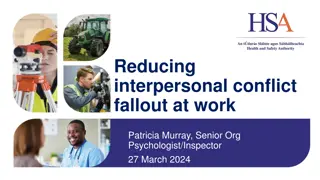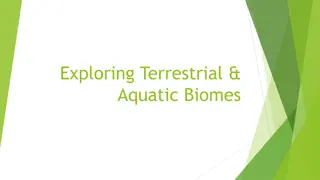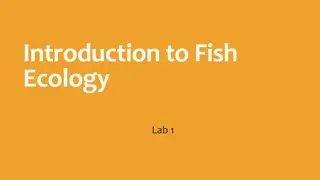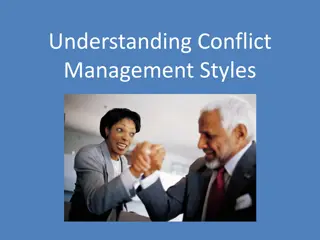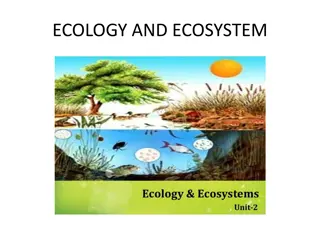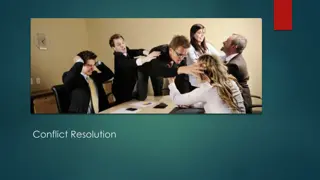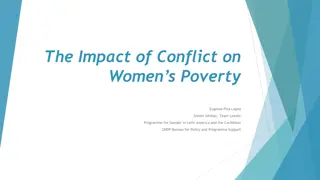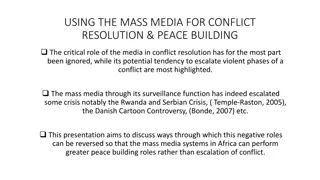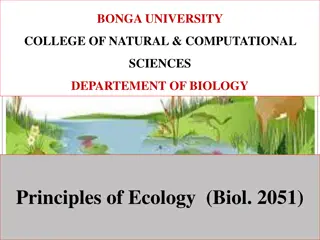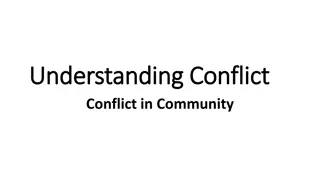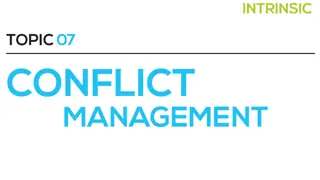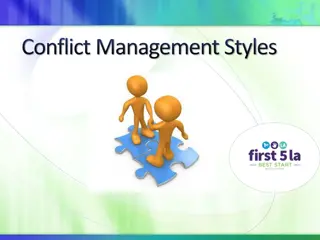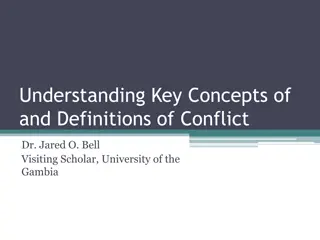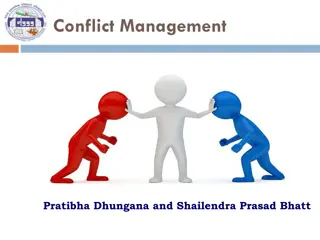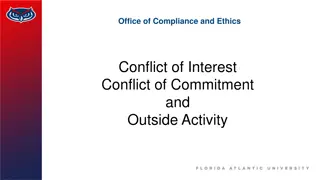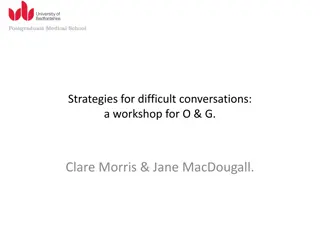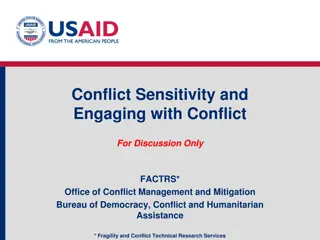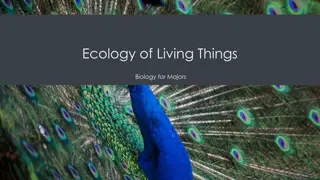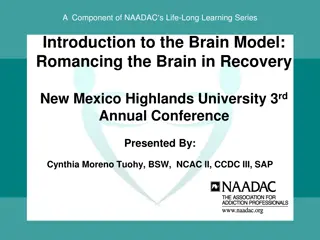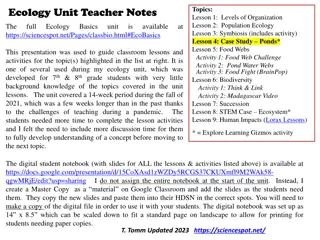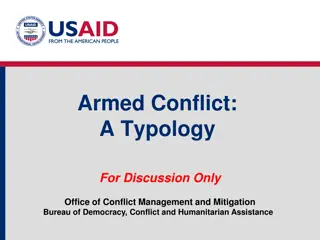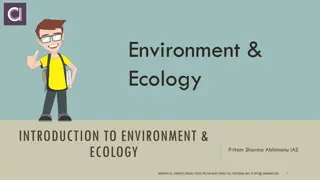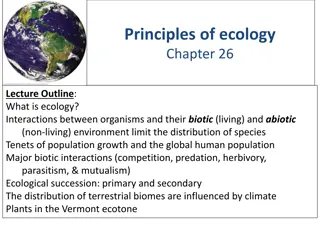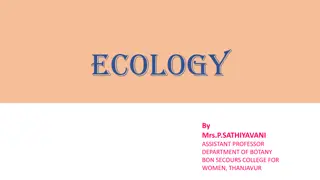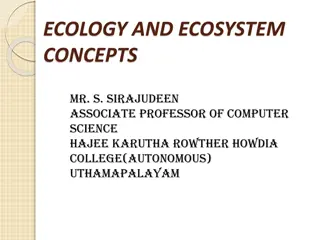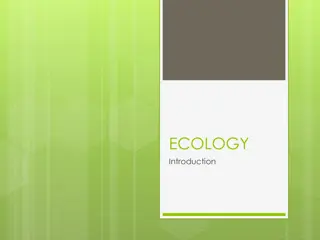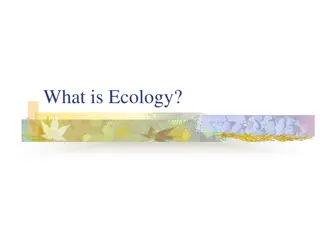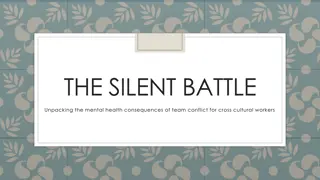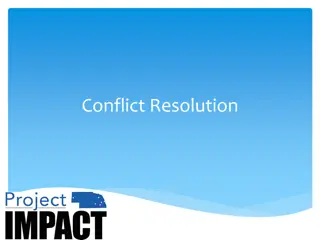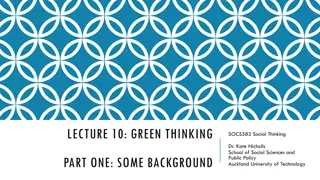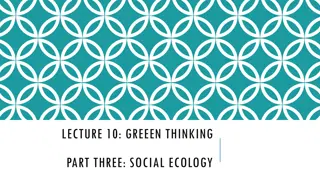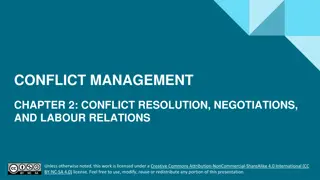Understanding Ecology: Interactions Between Organisms and their Environment
Ecology is the scientific study of how living organisms interact with each other and their environment. It delves into the relationships between biotic and abiotic factors, encompassing topics such as the distribution and abundance of organisms, structural adaptations, behavior under natural conditi
2 views • 42 slides
Effective Strategies for Managing Interpersonal Conflict at Work
In this seminar led by experts in organizational psychology, attendees learn practical approaches to reduce interpersonal conflict fallout in the workplace. Discussions range from understanding individual and organizational factors influencing conflict to exploring remedies for resolving conflict es
1 views • 21 slides
Understanding Ecosystems: Ecological Interactions and Dependencies
Ecology is the study of how organisms interact with their environment, influencing their distribution and abundance. This exploration covers terrestrial and aquatic biomes, energy flow, environmental impacts, adaptations, and global ecosystems, emphasizing the interconnectedness of all living organi
2 views • 58 slides
Understanding Fish Ecology: Interactions, Diversity, and Environmental Factors
Fish ecology involves studying the distribution, interactions, and abundance of fish species in different ecosystems. This lab delves into the divisions of ecology, fish species diversity in marine and freshwater ecosystems, and the environmental factors affecting fish diversity and abundance. Disco
1 views • 7 slides
Understanding Conflict Management Styles in Campus Life
Conflict management styles play a crucial role when resolving issues on campus. Knowing how to handle conflicts effectively is key to managing stress and navigating various situations. This article explores different conflict origins, the positive aspects of conflict, five common conflict management
0 views • 14 slides
Conflict Management Strategies in Organizational Behavior
Explore strategies for managing conflict and negotiation in the workplace, including the importance of conflict resolution and crucial conversations. Learn about the history of negotiating techniques within organizational behavior, the definition of conflict, types of conflict, stages of the conflic
2 views • 36 slides
Understanding Religious Conflict: Definition and Types Explored
Religious conflict is a complex and recurring concept throughout history. Scholars have defined it as disagreements between religious groups. This conflict arises from contentious issues touching on ideology, morality, power, and identity, influenced by various socio-political, economic, and cultura
1 views • 13 slides
Understanding Ecology and Ecosystem: A Comprehensive Overview
Ecology, derived from the Greek word "oikologie," explores the interactions between organisms and their environment. The study encompasses various branches like human ecology, population ecology, and habitat ecology, focusing on the relationships within ecosystems. An ecosystem, defined by A.G. Tans
1 views • 68 slides
Effective Conflict Resolution Strategies for Positive Outcomes
Understand the basics of conflict, learn essential skills for resolution, recognize different conflict management styles, work better in teams, and utilize goal setting to prevent conflicts. Discover the impact of conflicts on relationships and explore unhealthy responses along with healthy conflict
0 views • 30 slides
The Impact of Conflict on Women's Poverty: Insights and Analysis
Poverty and conflict are intertwined in complex ways, where conflict reallocates resources away from development, exacerbating poverty levels. Chronic internal wars can lead to chronic poverty, particularly in states with collapsed governance systems. Addressing the multi-layered dynamics of conflic
0 views • 10 slides
Leveraging Mass Media for Conflict Resolution & Peace Building in Africa
The critical role of mass media in conflict resolution is often overlooked, though it can also escalate violence. This presentation highlights how the media can reverse negative roles to enhance peace building in Africa, focusing on types of conflicts, phases of conflict, and the evolving role of me
2 views • 13 slides
Understanding Media Ecology: Impact of Communication Technology
Media ecology is a theoretical concept analyzing the influence of media and communication technology on human culture. Neil Postman, a prominent figure in the field, delves into how communication media affect human perception, understanding, and values. This study views media as environments shaping
4 views • 23 slides
Principles of Ecology: Understanding Organism-Environment Interactions
Ecology is the scientific study of how living organisms interact with each other and their environment. It involves understanding organisms at their native habitats, from individuals to ecosystems. The discipline encompasses various branches and focuses on the relationships shaping the distribution
1 views • 14 slides
Understanding Conflict in Community
Conflict arises when beliefs or actions of one group are resisted or unacceptable to another, leading to friction and discord. Individuals or groups engage in conflicting acts due to inconsistent wants, needs, or obligations. Conflict theory explains how tensions from uneven distribution of resource
0 views • 23 slides
Exploring Conflict Management in Conservation Settings
Delve into conflict management objectives, activities, and understanding the nature of conflict in conservation. Dive deep into types of conflict, factors causing conflicts, and the importance of effective communication. Explore the tools for conflict analysis and reflection to promote resolution an
1 views • 10 slides
Conflict Management Styles Training and Assessment
Explore different conflict management styles such as SHARK, OWL, FOX, TEDDY BEAR, and TURTLE. Learn the importance of understanding conflict, identifying sources, and managing conflicts effectively. Discover your dominant conflict style through an interactive assessment. Enhance your conflict resolu
0 views • 17 slides
Workplace Skills: Leadership Conflict Mitigation Strategies
Explore the impact of conflict on individuals and groups, learn how conflict can be managed positively, understand conflict mitigation skills, and practice using the Open The Front Door (OTFD) formula for effective conflict resolution in various scenarios.
0 views • 12 slides
Understanding Conflict: Key Concepts and Definitions
Explore the key concepts and definitions of conflict as discussed by Dr. Jared O. Bell, a visiting scholar at the University of the Gambia. Delve into the various levels, aspects, types, and styles of conflict, along with its sources and tractability. Gain insight into both the negative and positive
0 views • 40 slides
Effectiveness of Conflict Resolution Education in Schools
Conflict resolution education plays a crucial role in transforming school environments by reducing violence and promoting win-win outcomes. Various successful programs have shown significant improvements in school settings, such as reduced suspensions and conflicts among students. Conflict resolutio
9 views • 6 slides
Understanding Conflict Management: Key Perspectives and Approaches
Explore the multifaceted realm of conflict management through the lenses of traditional, humanistic, and interactionistic views. Delve into the definition, nature, and implications of conflict, and assess varying opinions on confrontation, communication, and resolution strategies within organization
1 views • 31 slides
Understanding Conflict of Interest, Conflict of Commitment, and Outside Activity in Compliance and Ethics
Exploring the concepts of conflict of interest, conflict of commitment, and outside activity in the context of compliance and ethics in a professional setting. This includes definitions, examples, prohibited conflicts, and considerations for maintaining ethical standards in both personal and profess
0 views • 10 slides
Strategies for Difficult Conversations Workshop Overview
This workshop focuses on enhancing feedback skills and providing effective strategies for handling difficult situations and conversations in obstetrics and gynecology. It addresses the key premise that undermining behavior can be avoided through careful feedback, conflict management, and appropriate
0 views • 41 slides
Conflict Management and Violence Prevention Workshop by Southern Cross Psychology
Workshop on conflict resolution and violence prevention held in November 2014 by Southern Cross Psychology for the Timor-Leste Psychology Interest Group. The event covered topics such as stress theories, practical conflict resolution skills, managing body responses to conflict, and promoting psychol
0 views • 59 slides
Understanding Conflict Sensitivity Frameworks
Conflict sensitivity frameworks help organizations comprehend and act upon the context of conflict they operate within. By understanding the interaction between their programs and the conflict context, organizations can mitigate negative impacts and enhance positive outcomes. The Conflict Interventi
1 views • 7 slides
Understanding Ecology: Interactions and Environments in Biology
Ecology is the study of interactions between living organisms and their environment. It involves levels of research such as animal ecology, plant ecology, and more, while also exploring the biosphere's impact, biogeography, species distribution patterns, and energy sources like sunlight. Ocean upwel
1 views • 80 slides
Exploring the Brain and Conflict Resolution in Recovery
Delve into the complexities of the brain with a focus on the limbic system and cortex. Learn how the brain reacts in conflict situations and discover strategies for conflict resolution in recovery. Gain insights into the functions of the limbic system, located at the center of the brain, and the cor
0 views • 25 slides
Conflict Management Strategies for Effective Team Performance
Explore the importance of conflict management within teams, common conflicts in drug court teams, barriers to healthy conflict management, and strategies to enhance conflict resolution. Understand the misconceptions and truths about conflict, how process conflict impacts group performance, and the b
0 views • 33 slides
Comprehensive Ecology Unit for Middle School Students
Engage 7th & 8th grade students in a 14-week ecology unit covering topics like levels of organization, population ecology, symbiosis, biodiversity, human impacts, and more. Utilize digital notebooks, interactive activities, and exploration tools to enhance learning and understanding. Access resource
0 views • 18 slides
Understanding Armed Conflict Typology and Vulnerable Countries
This discussion explores armed conflict typology, including active conflict, post-conflict, and conflict-vulnerable states. It outlines definitions, criteria for categorization, and identifies countries in Africa, Latin America, Asia, and the Middle East currently facing fragility or instability ris
0 views • 10 slides
Introduction to Ecology and Environment Studies
Ecology is the study of the relationship between organisms and their environment, while the environment refers to the surroundings that influence living organisms. The biosphere is divided into the atmosphere, lithosphere, and hydrosphere. Terms in ecology include species, populations, communities,
0 views • 13 slides
Exploring Ecology: Interactions, Distribution, and Population Dynamics
Ecology delves into the relationships between organisms and their environment, understanding factors that limit species distribution, major interactions like competition and predation, as well as population growth patterns. This includes the influence of biotic and abiotic factors, ecological succes
0 views • 30 slides
Understanding Ecology: Key Concepts and Types Explained
Ecology, a vital branch of science, delves into the relationships between organisms and their environment. It encompasses biotic and abiotic factors, studying how living and non-living elements interact within ecosystems. Biotic components include living organisms like plants and animals, while abio
0 views • 7 slides
Ecology and Ecosystem Concepts: Understanding Interrelationships in Nature
Ecology explores the interconnections between living organisms and their environment, dating back to zoologist Geoffroy St. Hilaire's early proposal in 1859. The term "ecology" originates from the Greek words for house and discourse, emphasizing the study of organisms within their habitat. Ecosystem
0 views • 36 slides
Exploring Ecology: Interactions and Environments
Dive into the world of ecology, where organisms interact and rely on each other and their surroundings. Understand the concepts of populations, communities, ecosystems, biomes, and the biosphere. Explore the vocabulary of ecology, from individual organisms to entire biomes. Learn about food chains,
0 views • 14 slides
Understanding Ecology: Interactions in the Environment
Ecology, originating from the Greek words "Oikos" and "Logos," is the study of interactions between living and non-living components in the environment. It encompasses the relationships between plants, animals, microorganisms, and abiotic factors like light, water, nutrients, and atmosphere. Studyin
0 views • 16 slides
Unpacking the Mental Health Consequences of Team Conflict for Cross-Cultural Workers
This content delves into the silent battle of unpacking the mental health consequences of team conflict for cross-cultural workers. It discusses causes of conflicts, the relationship attachment model, traits of problematic individuals, other conflict triggers, impacts of conflict, and navigating con
0 views • 12 slides
Effective Conflict Resolution Strategies Workshop
Explore the importance of healthy conflict resolution, identify primary causes and responses to conflict, learn about the 5 conflict styles, and understand how to resolve conflicts in a productive manner. Discover common causes of conflict, responses to conflict, and different conflict styles such a
0 views • 23 slides
Exploring Green Thinking: Societal Perspectives on Environment and Ecology
Delve into the realm of green thinking through the eyes of social sciences in this lecture by Dr. Kate Nicholls at Auckland University of Technology. The discourse ranges from traditional Western views on nature to the rise of the green movement, including discussions on deep ecology, social ecology
0 views • 9 slides
Exploring Social Ecology and Anarchism: A Path to Sustainable Future
Social ecology emphasizes the interconnectedness between social issues and environmental problems, advocating for a society without domination or centralized control. Anarchism, often associated with social ecology, critiques hierarchy and promotes cooperation. The affinity between feminism and ecol
0 views • 8 slides
Conflict Management Strategies and Negotiations in the Workplace
This chapter covers conflict resolution, negotiations, and labor relations in the workplace. It includes stages in the conflict process, conflict escalation, approaches to conflict resolution, negotiation techniques, and strategies for managing and preventing conflicts at work. Additionally, it expl
0 views • 16 slides

